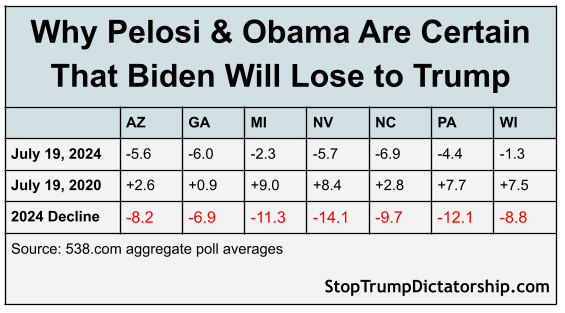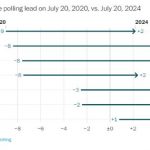President Joe Biden has resisted respectful calls by nearly every leading Democrat and pundit to step aside and make room for a younger, stronger candidate with a greater likelihood of beating Trump.
Biden’s inner ring of loyalists have circled the wagons and deployed a gaslighting campaign using these six deceptive myths to justify the president’s refusal to place the needs of the country over his stubborn ego.
Myth 1: Polling is Inconclusive
Polls consistently and conclusively demonstrate that if Biden is at the top of the ticket, Trump will soar to victory in November, probably taking control of the House and Senate with him.
Four years ago, July 19, 2020 polling averages had Biden up in all seven swing states: AZ +2.6, GA +0.9, MI +9.0, NV +8.4, NC +2.8, PA +7.7 and WI +7.5.
Poll averages for July 19, 2024 show Biden LOSING every one of these states: AZ –5.6, GA -6, MI -2.3, NV -5.7, NC -6.9, PA -4.4, WI -1.3.
That’s a downward swing of 7% to 14% in states that swung the election by at most a few points, and, in three deciding states, just a fraction of one percent.
If these numbers were not bad enough, during the past two elections, political polls have underestimated Trump’s strength. In 2020, Biden won by 4.4 points, even though poll averages suggested he would win by 8.6 points. In other words, if Biden is still the candidate on November 6, he is likely to lose by considerably MORE than the abysmal swing state polls suggest.
What is also apparent in the polling data is that it is not Democrats in general who are unpopular, but Joe Biden in particular. What is clear from state polls is that about 10% of all voters will vote against Biden because they perceive him as too old for the job.
We can even quantify this “Biden burden” on the ticket by looking at recent poll averages in three swing states where Biden is running alongside incumbent Democratic senators.
In Nevada, Biden polls about 13 points below Senate candidate Jacky Rosen. In Pennsylvania, incumbent Democrat Bob Casey is polling 15 points above the president. In Michigan, Elissa Slotkin polls 10 points better. And in Wisconsin’s senate race, Biden polls 9 points below Tammy Baldwin.
Myth 2: An Open Convention Would Mean Chaos & Election Loss Like 1968
Incumbent President Lyndon Johnson was 59 when he announced that he would not run for re-election in April, 1968. At that time, Robert F. Kennedy had just entered the race alongside Eugene McCarthy, an anti-war Senator from Minnesota. Johnson, who had expanded the unpopular war, thought that he might lose. He left the race and was replaced by his Vice President, Hubert Humphrey.
RFK might have become the Democratic nominee and beaten Republican Richard Nixon, but he was assassinated on June 5. The chaos that followed was compounded by bitter divisions within the Democratic Party over Vietnam, and closed caucuses which threw their backroom support behind pro-war Humphrey. This erupted into conflict on the streets of Chicago during the Democratic National Convention in late August, which helped Nixon win the November election.
This year, Democrats are not split over any major issue, much less one as contentious as the Vietnam War. Candidates vying for the nomination in an open convention on August 19 will focus on the one issue that unites all Democrats: beating Donald Trump.
Myth 3: Democrats Already Chose Biden in the Primary and Most Support Him Staying in the Race
This argument is as misleading as it is offensive. Biden took a big gamble in April, 2023, when he backed out of his comment that he would be a one term “bridge” president, to announce he would run for reelection. While it is true that incumbents typically run unopposed in their primary races, it is also true that Biden is the oldest person to ever run for president. He is eight years older than Ronald Reagan was when he ran for re-election in 1984.
Biden used his political and economic power over the Democratic Party and Democratic National Committee to deny voters a choice by successfully blocking a competitive primary in which younger, stronger candidates like Vice President Harris or Governors Gretchen Whitmer, Gavin Newsom, Josh Shapiro, or Andy Beshear might compete.
Not one of these popular Democrats attempted to risk their political future by defying the power of the party (and its multi-billion dollar purse), by daring to run in the primary.
Lesser known Congress Member Dean Phillips, the only office-holding Democrat who chose to run, was ruthlessly attacked by party loyalists, destroying his political future.
Turnout in the 2024 primary was near record lows in many states, with only 14 million Democrats voting for Biden. In 2020, 37 million Democrats voted in the primary. Most Democrats sat out the 2024 primary because they knew they had no real choice.
A recent national poll found that two thirds of Democrats and 75% of independents want Biden to step down. Even 50% of Black Democrats, some of Biden’s most stalwart supporters, want him to step aside.
Myth 4: Biden Has All the Money and Only He Can Spend It
There is no obstacle to funding a new nominee’s campaign with the money raised by Biden. Democratic PACs share and transfer money in a variety of ways as a regular part of election operations. The only thing that could stop contributions from being transferred is if Biden prevents it.
In addition, although Biden for President currently has around $90 million dollars on hand, the vast majority of contributions and spending are yet to come. In 2020, the Biden campaign raised and spent a total of $1.1 billion dollars, most of it after August, in the months leading up to the election.
Myth 5: Legal Challenges to a Late Nominee Change Will Sink Any Candidate Except Biden
Elaine Kamarck, one of the Democratic Party’s most experienced rules experts, recently debunked the argument that Republican lawsuits would ruin a replacement candidate. “The reason people tear their hair out is that people don’t realize that the business of nominating a presidential candidate is ultimately party business,” Kamarck told Politico.
Some states, such as Wisconsin, restrict when an already nominated candidate can be replaced on ballots. Others, like Virginia, will begin mailing ballots out in mid September. But as long as Biden doesn’t drop out after being nominated, then these rules would have no bearing.
Other potential legal challenges, such as threats made by the Heritage Foundation, are equally dubious. If Biden stands aside before or during the convention, chances of successful legal challenges to a different nominee are next to zero.
Myth 6: There is Not Enough Time for Anyone But Biden to Win
This “we’re stuck with Biden, make the best of it” argument flies in the face of the fact that 15 months after announcing his candidacy, after $200 million spent on advertising to boost his campaign, Biden’s poll numbers have declined. Today, they are the worst of any Democratic candidate in decades.
Biden’s favorability polls indicate that 38.6% of Americans view him favorably, with 57% unfavorable. More than three quarters of Americans believe he is too old to effectively serve as president.
Although it might not be fair, no amount of advertising is going to change the voter’s perception that Biden is too old for the job. While Trump, despite his age, is perceived as stronger.
France and England just held national elections in less time than the three and a half months between now and November 6. Voters clearly want a younger, stronger nominee to head the Democratic ticket. With a billion dollar marketing budget and the social media of tens of millions of Amercians desperate to stop a Trump dictatorship, a different nominee will easily have sufficient time to become more popular than Biden.
The good news is that Trump is also very unpopular. Only 41.5% of Americans view him favorably, while 54% polled view him unfavorably.
A new ticket, with a candidate at least 17 years younger than Trump, would flip the script on the presidential race. A telegenic, more powerful candidate could dominate diaper-wearing, dementia-lapsing Trump and attack him as too old and weak to lead our country. Women and young voters in swing states could be galvanized to turn out in record numbers for the first female president, helping Democrats win the presidency, hold the Senate and win back the House.
The six weak arguments debunked above should not stop Democrats from turning the Biden problem into an opportunity to win.
But Biden still has one strong factual argument for refusing to step down. Sad as it sounds, it is this: nobody can make him do it.
In other words, if Biden stubbornly insists on driving the prospect of winning this election off the cliff, then nobody can stop him.
Thankfully, Democratic Party rules provide delegates with legal grounds to select a different candidate.
Party rules state that, “Delegates elected to the national convention pledged to a presidential candidate shall in all good conscience reflect the sentiments of those who elected them.”
If the president refuses to resign simply because nobody can make him do it, then our emperor truly has no clothes. To save the party, and our nation, from a Trump landslide, these delegates, “in all good conscience,” would need to let Biden know that they love and appreciate him, and then take the car keys away.




